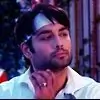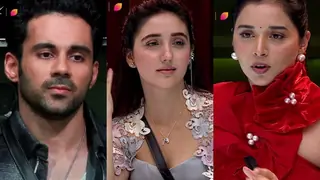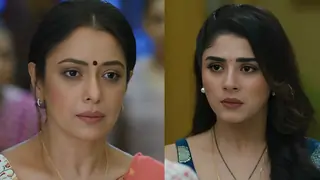Folks,
No, no, I do not mean to sound pompous by quoting a Latin tag - it means The Emperor reigns supreme - but somehow I love the word Imperator, so do bear with me!
As for our own Shahenshah, unki hukumat to na sirf unki riyaya ke dil aur zehen par hai, jaise unhon ne farmaya, par hum jaise anginat darshakon ke dil aur zehen par bhi hai. After watching Rajat's Jalal, on Friday last, sweep all before him despite the complex and demanding script, I was simply mesmerized.
By episode end, I had all but forgotten that there was a Rajat. For me, and I am sure for many of you as well, there was only Jalaluddin Mohammed, Shahenshah-e-Hind. Which is the ultimate compliment you can pay an actor.
Jalal explaining in the Diwan-e-Khas , with painful but candid dignity, why he was recusing himself from sitting in judgment on his sister's crime. Visibly struggling, as he called on Jodha Begum to pronounce judgment in his stead, to veil the trauma of betrayal by perhaps the only one whom he had ever loved, unreservedly, deeply, truly.
Jalal in Jodha's rooms, deeply troubled, his zehen wracked by bitter anger, unable in the end to hold back his tears as he insists that he can never forgive Bakshi Banu for what she had done.
Finally Jalal, because he feels it to be his duty to prevent Jodha Begum from becoming the subject of salacious and defamatory gossip across the empire, battling overt grief and hidden hurts that constrict his throat, for an unprecedented face to face with his riyaya, his awaam.
On Friday, the Shahenshah was, as Jodha would have said in her shudh sanskritised Hindi, sarvavyaapi. Wherever you turned, there was only Jalal. A Jalal angry, but even more so, distraught and devastated by the most painful of betrayals - like Julius Caesar. who exclaimed, when he saw his dearest friend Brutus stabbing him, Et tu, Brute? Then fall Caesar! Achingly lonely and bleeing inside, but yet somehow dredging up the strength to live up to the image of the Shahenshah that his awaam expects of him. And even amidst such personal despair, finding it in him to go out of his way to protect the wife who, he believes, cares nothing for him or worse.
Hamari riyaya hamari aulad hai: They used to say of Mahatma Gandhi that he could draw millions into a circle with him. Jalauddin Mohammed that day might not have managed millions, and then the distance, literal and psychological, between the emperor and the awaam in those days was huge and almost unbridgeable.
It was thus all the more remarkable that Jalal too could, in those few brief moments, with words so simple and direct and sincere, draw the mass of his subjects into his inner world. To take them into his confidence. To communicate to them both his sorrow at having been deprived, for so long, of the joys of fatherhood, and his stoic acceptance of whatever the Almighty might have in store for him. To speak to them from his heart about his hopes that had been dashed, about his fear that what he sought so desperately might never be his. And all this without any holding back, any sense of shame, any false pride.
Above all, in the final, climatic affirmation - that it mattered not if Jalaluddin was childless, since an emperor, whose riyaya were all his children, his janasheen, could never be beaulad - Jalal's peroration reached heights of eloquence and conviction worthy of the great orators of ancient Greece and Rome, of a Demosthenes or a Cicero.
Indeed, as there was , in this emperor reaching out to his subjects. no striving for effect, no attempt to make an impression, he was far more more appealing, far more touching than those legends could ever have been.
And this all the more as he made no attempt to maintain the traditional imperial stoicism, no attempt to hide the grief that pervaded his zehen. Instead, he literally bared his soul to his people, heedless of the likely pity that so proud a ruler would resent. Heedless of those who might mock him for a supposed lack of manliness, or those who might, as he said, rejoice at his loss.
There could not have been a single dry eye in his audience as his voice finally died away, and he turned to one side, surreptiously wiping away a rebellious tear that clouded his vision. There surely was no dry eye among his court (bar only Adham Khan).
Jalal probably did not see it, nor was he, lost in his own thoughts, looking for it. But as Jodha Begum, for whose sake he had done all this, wiped her own tears and looked up at him with unfeigned admiration and pride in eyes that glowed like stars, I was reminded once more of what Cleopatra had once said to Julius Caesar, with the same admiration and the same pride, but also with deep love. But for you, the world is full of little men.
Maybe Jodha is not yet quite where Cleopatra was, but she has taken her first step on the path that leads there. And I, remembering all that she had said and done which had constantly set my teeth on edge in recent weeks, was duly grateful.
In the Diwan-e-Khas and later: The opening sequence, which saw Jalal ceding to the main affected pary, Jodha Begum, his judicial powers, as the Shahenshah, to pronounce sentence on Bakshi, was perhaps less dramatic than the closing opening up to the awaam, but it was, in its own way, as emotionally powerful and, for Jalal, emotionally draining.
One could see that in every frame as Jalal stood up to explain why his sister was now being judged for a crime, and then why he was not judging her himself but commanding Jodha Begum to do so. It was visible in his lowered eyes, in his straining to appear at least partly normal, to retaint the aura of an emperor who has to be above all sentiment, above all ties of blood and affection, when he ascends the throne and becomes solely a dispenser of justice.
That he chooses not to do that is not - as Hamida Banu states with characteristic lack of understanding, whether of her son or of the issues involved- that the Shahenshah in him has not been able to prevail over the brother. It is rather that for the Shahenshah, the imperative of not just doing justice, but being seen to do so, is paramount. If he were to decide the case himself, no matter how harsh the sentence he pronounces, keeping in mind that Bakshi Banu has no blood on her hands, the feeling will always linger among the awaam that he let her off lightly because she is his sister. There being no way of proving a negative, this impression would have remained as a black mark on his reputation.
Moreover, as I had mentioned in my last post, there is , in Islamic jurisprudence, the option, even in cases of murder, of a compromise settlement between the accused and the victims of the crime, even a full pardon, which can then be approved by the court.
So what Jalal does here is neither irregular nor extraordinary. Nor is the reason that he advances for it at all flimsy, and in fact it is the only logical course for him to take in order to preserve an image of strict impartiality. Even today, in the courts, no judge will hear a case in which he has any personal interest, such as the defendant being a close relative or friend.
A 16th century Portia ?: Jodha's preamble, the sentence she pronounces (after the mandatory suspense, while they show the reaction shots of everyone present ), and her final explanation of the sentence, as it is called in legal parlance, were all done very well, with compelling dignity and lucid eloquence. Paridhi looked lovely - sunny yellow seems to suit her the best - and put up a very convincing performance.
As for the rationale Jodha advances for her pardoning Bakshi Banu outright, and, in effect, letting go scot free, it sounds lofty and superficially convincing. It may or may not hold in this particular case - though I am pretty sure Bakshi Banu, if she were once more in Sharifuddin's orbit, would soon revert to her old, slavishly obsessed wife pattern, ready, as she says herself, to kill for him.
The point is that Jodha sees the redemptive power of forgiveness not as something applicable in this one case because of the circumstances, but as a general and universally valid principle, which it most assuredly is not.
Interpreting it thus would knock the bottom out of the entire judicial system and the very concept of crime and punishment. In fact, most hardened criminals, and criminals in the making like Sharifuddin or Adham Khan or Mahaam Anga, would laugh their heads off at such indiscriminate generosity, and promptly take advantage of it, only to revert to type very soon.
Not that Jodha, with her limited vision, can be expected to understand any of this. It is curious, however, seeing that she must have been used, even back in tiny Amer, to harsh punishments for traitors or even spies, witness Bharmal condemning Abdul to beheading without an instant's hesitation. Jodha was able to rescue him only on what would be called a technicality, not by citing the sweeping principle she enunciates now.
Bakshi Banu's crime is no less than treason, and she is also, indirectly, the cause of the murder of the Hakima. In fact, if the Hakima had managed to tear off her veil the first time, Bakshi Banu, with images of her husband being executed by Jalal flashing thru her mind, would very likely have stabbed the Hakima in blind panic. There is no one so violent as a weak person who has been cornered. But the gravity of even what she did do, which is considerable, does not seem to weigh with Jodha.
It was precisely this kind of self-indulgent leniency which led Prithviraj Chauhan to not even imprison the defeatedMohammed Ghori, but let him go home, only to have him return the very next year, 1192 AD, defeat Prithviraj, and wreak unimaginable horrors on the population across North India. It is typical of our national psyche and our passion for being thought of as mahaan that he is never criticized for this irresponsibility which had such horrendous consequences for his subjects.
Jodha and Jalal: I was not overly impressed with the follow up scene in Jodha's rooms, where Jalal questions the rationale for Jodha's pardoning Bakshi Banu. She parrots what Salima and Bakshi Banu herself told her earlier, like a lesson learnt by heart, as if it was Holy Writ, while the fact is that she does not know anything about what she asserts with such assumed certitude.
What is more, she ends up portraying Bakshi Banu to a mindless puppet, which she most definitely is not, neither now, nor when she lied about her husband's role in the Ratanpur fort fraud. Both times, she is perfectly conscious of what she is doing, and this time she is, moreover quite ready to take the initiative and prepare more of the ark for spiking Jodha's food and drink. Is this a poor, helpless, manipulated wife, or a willing accomplice currying favour with her husband?
Most serious of all, Jodha's argument, that a woman's blind adoration of an evil and manipulative husband is enough of an extenuating circumstance for pardoning her even a deliberate and serious crime, amounts to a complete negation of the universal moral and legal principle of personal responsibility for one's acts. This sort of exemption is valid only for a child, not for a grown up, twice married woman.
Moreover, for Jodha to equate her relationship with Bakshi Banu, the nanad with whom she has had barely a few cordial meetings, with Jalal's lifelong bond of deep and protective love and caring, and using this false equation to demand that as she has forgiven Bakshi Banu, so should he, is nonsense. That she even advances this thesis, and does not have a word of understanding or empathy to offer about the depth of Jalal's grief at the betrayal he has suffered, only reinforces what I had written in my last post.
"Jodha clearly has no notion of what Jalal is going thru, of how his innermost feelings are being put thru a wringer. She does not have the imagination, the perceptiveness, to feel his anguish ... She cannot understand how it feels to be betrayed by a dearly loved sister, the terrible sense of alienation that it creates; she sees it simplistically, as a case to be solved by magnanimous forgiveness".
So, when he turns away to hide his helpless tears, she interprets that by her lights, as proof that he loves Bakshi Banu regardless of whatever she might have done and will soon pardon her. She cannot see that while he might well still love his sister, his tears are an expression of a pain too deep to hide, and a heart too lacerated to heal any time soon. That there are hurts that are too visceral to be healed by facile, pious pronouncments.
The only lasting foundation of true love is understanding and empathy, which in turn means the ability to see situations thru the eyes of the other. As far as Jalal is concerned, Jodha, as of now, has neither. I am left wondering as to how and when this state of affairs is going to be remedied.
The precap: I was bemused by the vision of Jodha, who till the day before was affirming to all and sundry that she has nothing but ghrina for her imperial husband, lecturing and quizzing Ruqaiya, who has been thru thick and thin with Jalal from the time she was a child, about the nature of her love for him. It sounded most presumptuous and ill-advised, and no wonder that Ruqaiya reacts so sharply.
But then I read Ritu99's delightful thread, and light dawned on me. Obviously apni Jodha is now a PhD candidate, and the subject of her thesis is The varying kinds of love. Do look up Ritu's thread at http://www.india-forums.com/forum_posts.asp?TID=3822097.
Shyamala B.Cowsik





































29